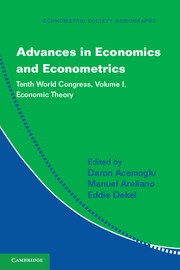Book contents
- Frontmatter
- Contents
- Contributors
- Preface
- I NONSTANDARD MARKETS
- II CONTRACTS
- III DECISION THEORY
- 7 Ambiguity and the Bayesian Paradigm
- 8 Temptation
- 9 Comments on “Behavioral” Decision Theory
- IV COMMUNICATION/ORGANIZATIONS
- V FOUNDATIONS: EPISTEMICS AND CALIBRATION
- VI PATENTS: PROS AND CONS FOR INNOVATION AND EFFICIENCY
- Name Index
- Miscellaneous Endmatter
7 - Ambiguity and the Bayesian Paradigm
Published online by Cambridge University Press: 05 May 2013
- Frontmatter
- Contents
- Contributors
- Preface
- I NONSTANDARD MARKETS
- II CONTRACTS
- III DECISION THEORY
- 7 Ambiguity and the Bayesian Paradigm
- 8 Temptation
- 9 Comments on “Behavioral” Decision Theory
- IV COMMUNICATION/ORGANIZATIONS
- V FOUNDATIONS: EPISTEMICS AND CALIBRATION
- VI PATENTS: PROS AND CONS FOR INNOVATION AND EFFICIENCY
- Name Index
- Miscellaneous Endmatter
Summary
Introduction
Varying Probability Estimates
John and Lisa are offered additional insurance against the risk of a heart disease. They want to know the probability of developing such a disease over the next ten years. The happy couple shares key medical parameters: They are both seventy years old, smoke, and never had a blood-pressure problem. A few tests show that both have a total cholesterol level of 310 mg/dL, with HDL-C (i.e., good cholesterol) of 45 mg/dL, and that their systolic blood pressure is 130. Googling “heart disease risk calculator,” they find several sites that allow them to calculate their risk. The results (May 2010) are as follows:
As shown in the table, the estimates vary substantially: The highest for John is 100 percent higher than the lowest, whereas for Lisa the ratio is 5:2. Opinion diverges in these examples, even though they are based on many causally independent observations that allow the use of statistical techniques (e.g., logistic regression). However, in many important economic questions (e.g., the extent of global warming), there are few past events on which to rely. Furthermore, many events (e.g., revolutions and financial crises) cannot be assumed independent of past observations. Thus, it appears that for many events of interest, we cannot define an objective, agreed-on probability.
Information
- Type
- Chapter
- Information
- Advances in Economics and EconometricsTenth World Congress, pp. 179 - 242Publisher: Cambridge University PressPrint publication year: 2013
Accessibility standard: Unknown
Why this information is here
This section outlines the accessibility features of this content - including support for screen readers, full keyboard navigation and high-contrast display options. This may not be relevant for you.Accessibility Information
- 86
- Cited by
